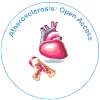Understanding Peripheral Artery Disease: Causes, Symptoms, and Treatment
Received Date: Nov 01, 2023 / Accepted Date: Nov 30, 2023 / Published Date: Nov 30, 2023
Abstract
Peripheral Artery Disease (PAD), a common vascular condition, arises from atherosclerosis, resulting in narrowed or blocked arteries, predominantly in the legs. The causes and risk factors for PAD encompass smoking, diabetes, high blood pressure, high cholesterol, age, family history, obesity, and inactivity. Symptoms include intermittent claudication, coldness, numbness, sores, ulcers, weak pulses, hair loss, and shiny skin. Diagnosis relies on physical examination, ankle-brachial index, Doppler ultrasound, angiography, and blood tests. Treatment involves lifestyle changes, medication, angioplasty, stenting, bypass surgery, exercise therapy, wound care, and symptom-relief medications. Early detection and management are crucial to mitigate complications, making PAD a condition that warrants attention and care.
Citation: Halley E (2023) Understanding Peripheral Artery Disease: Causes,Symptoms, and Treatment. Atheroscler Open Access 8: 238.
Copyright: © 2023 Halley E. This is an open-access article distributed under theterms of the Creative Commons Attribution License, which permits unrestricteduse, distribution, and reproduction in any medium, provided the original author andsource are credited.
Share This Article
Open Access Journals
Article Usage
- Total views: 547
- [From(publication date): 0-2023 - Mar 12, 2025]
- Breakdown by view type
- HTML page views: 460
- PDF downloads: 87
